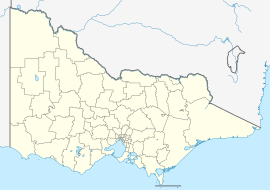History
The area now known as Eurobin developed as a wayside stop during the Buckland Valley gold rush in 1853. [2] Over the years, Eurobin grew to include essential services and structures, such as a school, [4] [5] [6] Eurobin railway station, [7] [8] post office, [7] [8] [9] [10] Presbyterian Church, [11] [12] and Boyd's Eurobin Hotel. [13] [14] [15] [16] [17]
In 1899, the Ovens and Murray Advertiser described Eurobin during a period of decline: "After a seemingly endless morning tramp, we entered the little township of Eurobin, which looks lonely and worn, resting on its little bit of rising ground. It seemed as if it had known trouble by its remnants of fences, dilapidated and tired-looking houses, and the battered-in windows of the old schoolhouse." [18] That snapshot reflects a time of hardship and transition.
However, Eurobin experienced periods of renewal, as evidenced by the construction of two churches in 1910: St Clement's Church Eurobin, a Church of England establishment, and the St John's Presbyterian Church. Those buildings symbolised a sense of optimism and resilience in the community, showcasing its ability to recover and thrive despite earlier challenges.
Many of the original structures from Eurobin's early days have not survived, and St. Clement's Church is the only remaining community building from that period, holding historical, architectural, and social significance for the area.
This page is based on this
Wikipedia article Text is available under the
CC BY-SA 4.0 license; additional terms may apply.
Images, videos and audio are available under their respective licenses.


